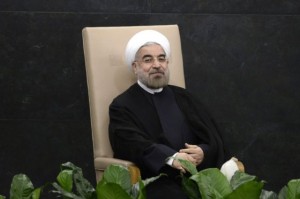 (Reuters) - President Hassan Rouhani has secured the backing of senior conservative clerics against hardliners opposed to a nuclear deal reached with major powers, Iran's official news agency IRNA said on Saturday.
(Reuters) - President Hassan Rouhani has secured the backing of senior conservative clerics against hardliners opposed to a nuclear deal reached with major powers, Iran's official news agency IRNA said on Saturday.His first vice president, Eshaq Jahangiri, visited clerics in the Shi'ite Muslim holy city of Qom to explain the deal and seek their blessing over "complex foreign policy issues" ahead of talks next month on a long-term accord, IRNA said.
An interim deal between�Iran�and the five permanent members of the U.N. Security Council plus�Germany�was reached in November in Geneva, aimed at persuading Iran to curb parts of its nuclear work, in return for a limited easing of sanctions.
Hardline clerics close to Iranian Supreme Leader Ali Khamenei, Revolutionary Guards commanders and the intelligence services have attacked the temporary concessions Rouhani has made, although Khamenei has so far backed the president.
Khamenei has the final say on all state matters, including the nuclear issue.
The talks on February 18 will seek a comprehensive agreement defining the permissible scope of Iran's nuclear activity. Western powers fear the nuclear program is aimed at creating atomic weapons capabilities.�Iran�denies this.
IRNA said the response of from the clerics in Qom, in central Iran, was unanimously positive.
Support from Qom, whose clerics traditionally have influence among core supporters of the establishment, is likely to boost Rouhani's government's position in the next round of talks in Vienna, having already won over more reform-minded clerics.
The backing of the clergy is essential as they have direct access to ordinary Iranians in their sermons when they can mobilize people to display their support for the deal, under which Tehran seeks to end painful economic sanctions that have severely damaged its oil-dependent�economy.
"This government has inspired hope in our society. Its way of communicating has put us in line with other cultures," said Grand Ayatollah Lotfollah Safi Golpaygani, referring to Rouhani's tone compared to his hardline predecessor, Mahmoud Ahmadinejad, since his landslide election win.
Demonstrating their support for Rouhani, some clerics blamed Ahmadinejad's government for the struggling�economy�as well as Iran's political isolation.
"Poor leadership by the previous government is at the root of much of our problems today," IRNA quoted conservative Ayatollah Abdollah Javadi-Amoli as saying.
Rouhani, whose election led to a thaw in ties with the West after years of confrontation and hostile rhetoric, has promised to pursue a consistent foreign policy of "prudence and moderation" to revive the economy.
Nasser Makarem-Shirazi, another influential conservative cleric, went even further: "Everything done during and by the previous government entailed some kind of problem. The present administration should address them gradually."
By Reuters
The Iran Project is not responsible for the content of quoted articles.










